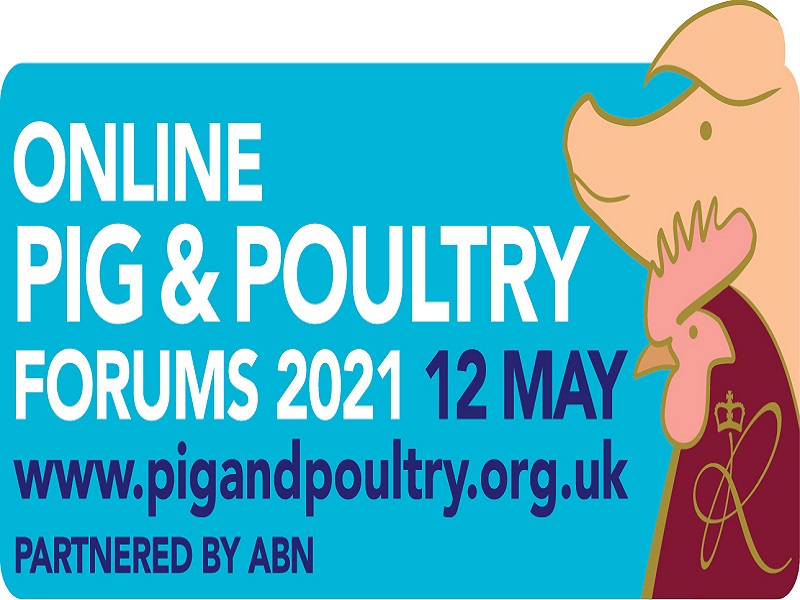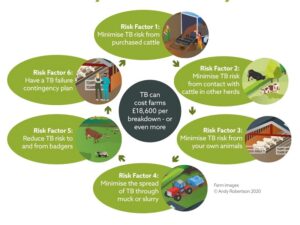Pig and poultry producers can get all of the latest information and advice about developments in their sector at the Pig & Poultry online forums on 12 May. Partnered by ABN, the programme for the day will include the popular pig, poultry meat and egg outlooks, plus a number of technical sessions, all of which will be free to attend live online.
“Attending the outlook sessions at the online Pig and Poultry Forums gives producers the opportunity to hear about the things that matter to their own business from a variety of representatives from across the supply chain including farmers, packers, retailers and trade bodies,” says NFU chief poultry adviser Aimee Mahony. “With the sessions taking place virtually this year you don’t even need to leave the farm to get the latest information!”
So what can visitors expect from the day?
Poultry meat outlook
It’s been a difficult year for the poultry industry, with Covid-19, Brexit and avian influenza all causing market disruption. But there is room for cautious optimism, according to Danny Johnson, commercial director at ABN,
Consumers are increasingly focusing on higher welfare and slower growing birds, and retailers will want to meet those demands, he explains. This will require a joined-up approach throughout the supply chain – and a higher price at the end of it, he adds. “In this forum we will be hearing from Sophie Throup at Morrisons and Jonty Hay, who sits on the Red Tractor board for independent producers. I am looking forward to hearing their thoughts on what retailers want and how that will fit into the standards. Ultimately, we all want to know what that change will mean for producers.”
Managing the slower growing bird
So how can producers deliver on these consumer demands? According to Patrick Nicholls, technical sales manager at Hubbard, the answer lies in the genetics of the bird, combined with the feed it is given.
When selecting the right breed, a producer must first look at what they’re looking to produce: Do they want a 2.5kg bird at 49 or 56 days, or a 2kg bird at 70 days? “Diets then need to be tailored to the specific requirements of the breed and the production system. In slower growing systems health is normally good. Gut health also tends to be stronger, litter quality is significantly better, and liveability is excellent. I’ve also been told that the farmers themselves experience better job satisfaction with slower growing breeds.”
Egg outlook
In the egg sector, the looming colony cage ban by retailers will create significant disruption, warns Tom Willings, supply chain director at Stonegate. “Very few retailers have supported the scale of investment required to convert 50% of production and 30% of the retail trade to free-range or barn. My expectation is that, in the short-term, prices will go up. But high prices will then motivate oversupply.”
Other trends include the continuing pull between ethics and economics, quickly followed by environmental issues. There are also new challenges coming down the track, says Mr Willings. These include a potential ban on beak trimming, slaughter of day-old male chicks, and transport and slaughter of end-of-lay hens. “We only need to look at the EU to see what’s coming – there is a strong direction of travel which we cannot ignore.”
What does Net Zero look like for free-range eggs?
When it comes to environmental issues, farmers will be keen to hear the findings of an in-depth study commissioned by the British Free Range Egg Producers Association. “We have been looking at the environmental credentials of egg production for a long time,” says BFREPA chairman James Baxter. “But practical, meaningful information is not always obvious or easily accessible, and that’s the barrier we’re trying to break down.”
As part of the study, consultancy firm Promar International has been working with a multi-tier unit in Wales and a flat-deck system in Devon to capture findings from commercial operations at different scales. Its target is to produce a report which shows farmers how to mitigate risk, build resilience, source responsibly and unlock revenue streams.
Pig outlook
The consumer themes of higher animal welfare and environmental improvements are mirrored in the pig sector, and Morrisons is taking practical steps to help its farmer suppliers to meet these demands. “Customers like to feel that an animal has a life worth living, so we’re very keen on environmental enrichment for indoor pigs to provide entertainment and interaction,” says Sophie Throup, head of agriculture, fisheries and sustainable sourcing at Morrisons.
The retailer recently published its commitment for its whole supply chain to be net zero by 2030 – and to help farmers to meet these targets it is setting up a School of Sustainable Food and Farming with Harper Adams University. “This will provide research and training to farmers,” explains Mrs Throup. “We need to find a balance between productivity, yield and health.”
Ammonia – What is coming?
The Government’s Clean Air Strategy presents another environmental challenge: It has signed up to reduce emissions by 16% by 2030. Given that 87% of the UK’s emissions come from agriculture, there will be plenty of measures affecting farmers, warns Dr Philippa Mansfield, agricultural lead at the Catchment Sensitive Farming partnership. “A lot of those will be to do with manure storage and application, nitrogen fertiliser use and housing design standards.”
To help farmers adapt to these changes, Defra is planning to introduce several new grant schemes, says Dr Mansfield. These include Countryside Stewardship, the Farming Equipment and Technology Fund and the Slurry Investment Scheme, all of which will offer capital grants for air and water quality options like slurry store covers, robotic scrapers and precision farming equipment.
Optimising sow and pre-weaning piglet performance
To further maximise efficiencies and help pigs reach their potential, producers need to adjust their feed patterns to keep up with the change in pig genetics. Chris Opschoor, manager of global nutrition at Topigs Norsvin, says the genetic improvement in pigs is averaging 1.5-2% per year – so taken over five years or more, that needs to be reflected in how they are managed. “If you’re looking for increased litter size and high weaning weights, you need to feed and manage them for such high output.”
In an ideal world, young gilts should have a ration designed for body weight gain, while older sows need to maintain bodyweight without getting overweight. “Not everyone is ready for precision feeding of sows, but the long-term savings and benefits are there. You can’t keep pushing for higher production and keep inputs the same.”
Panel: Programme for Online Pig & Poultry Forums
| Sector | Forum | Speakers | |
| Poultry | 09:00 | Poultry Meat Outlook | Danny Johnson, ABN (Chair)
Sophie Throup, Morrisons David Neilson, Avara Foods Jonty Hay, Hay Farms |
| 10:00 | Success with the slower growing bird | Matthew Donald, (Chair)
Patrick Nicholls, Hubbard Charles Bourns, Producer & NFU Poultry Board |
|
| 10:45 | On farm hatching for welfare and performance | Jake Davies, Poultry Network (Chair)
Erik Hoeven, Nestborn Tom Wornham, Poultry Producer |
|
| Pigs | 11:30 | Pig Outlook | Mike Sheldon, AHDB (Chair)
Sophie Throup, Morrisons Andrew Saunders, Pilgrim’s Pride Rob Mutimer, NPA |
| 12:30
|
Optimising sow and pre-weaning piglet performance | Steve Jagger, ABN (Chair)
Chris Opschoor, Topigs Norsvin Kristian Volshoj, AB Neo |
|
| 13:15 | Ammonia: What’s coming, how to prepare and funding opportunities | Jon Foot, AHDB (Chair)
Philippa Mansfield, Catchment Sensitive Farming Simon Lague, Big Dutchman Daniel Holling, Big Dutchman |
|
| Eggs | 14:30 | Egg outlook | Aimee Mahony, NFU Chief Poultry Advisor (Chair)
Tom Willings, Stonegate Farmers Rebecca Tonks, St Ewe Free Range Eggs Mark Williams, British Egg Industry Council |
| 15:30 | Importance of water quality on layer performance | Ian Lowery, Crowshall Vets
Christine Parry, ABN (Chair) |
|
| 16:00 | What does Net Zero look like for free range eggs? | James Baxter, BFREPA (Chair)
Heather Webb, Promar |
- Farmers and stakeholders from across the supply chain can register for free to watch the forums throughout the day and put questions to the panellists. To find out more and secure your place visit pigandpoultry.org.uk




